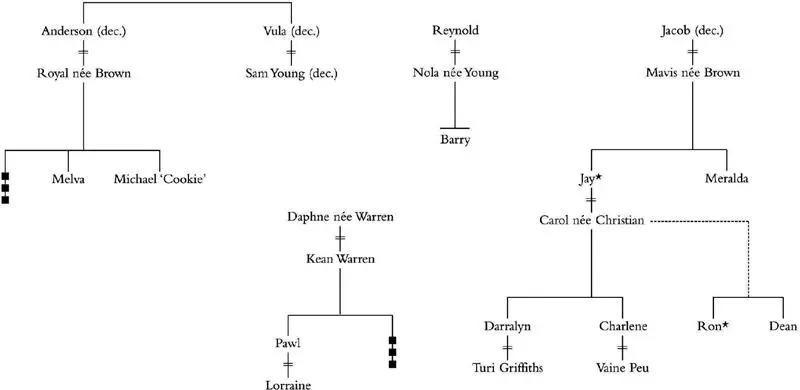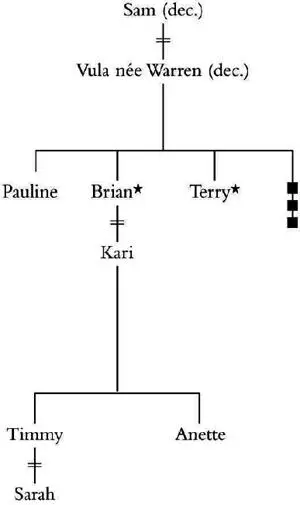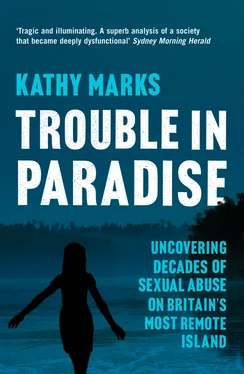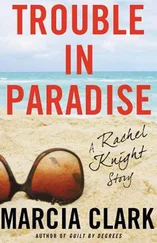TROUBLE IN
PARADISE
Uncovering the Dark Secrets of Britain’s Most Remote Island
KATHY MARKS
For my parents
Cover
Title Page
Dedication
Cast of characters
Christian clan
Brown family
Warren clan
Young family
Prologue
Part 1—On the island
1 A surreal little universe in the middle of nowhere
2 Mutiny, murder and myth-making
3 Opening a right can of worms
4 No amnesty
5 The fiefdom and its leader
6 The propaganda campaign starts
7 Key witnesses evaporate
8 The trials begin
9 Let’s make-believe
10 Judgement day
11 ‘You can’t blame men for being men’
Part 2—Viewing Pitcairn from a distance
12 How the myth was forged
13 Politics, poison and power plays
14 Britain’s ‘ineffective long-range benevolence’
15 ‘I just did my job and minded my own business’
16 Interdependence + silence = collusion
17 Making legal history
18 The final trials
19 Reaping a sad legacy since Bounty times
20 Lord of the Flies?
21 The last throw of the dice
Epilogue—Isobel’s story
Acknowledgements
Copyright
About the Publisher
Historical figures
Edward Christian (Fletcher’s brother)
Edward Young (mutineer)
Fletcher Christian (mutineer)
Harry Christian (hanged in 1898 for murder of wife and baby)
John Adams (mutineer and community leader)
Maimiti (Fletcher Christian’s Tahitian ‘wife’)
Matthew Quintal (mutineer)
Peter Heywood (mutineer court-martialled then pardoned)
William Bligh (captain of Bounty )
William McCoy (mutineer)
Media
Claire Harvey ( The Australian ; The Times )
Ewart Barnsley (Television New Zealand)
Kathy Marks ( The Independent ; New Zealand Herald )
Neil Tweedie ( The Daily Telegraph ; Press Association)
Sue Ingram (Radio New Zealand)
Zane Willis (TVNZ)
Officials and diplomats
Baroness Patricia Scotland (Former Overseas Territories Minister)
George Fergusson (Governor at time of writing)
Grant Pritchard (former Governor’s Representative)
Harry Maude (British colonial official in 1940s)
Jenny Lock (former Governor’s Representative)
Karen Wolstenholme (former Deputy Governor)
Leon Salt (former Commissioner)
Leslie Jaques (Commissioner at time of writing)
Martin Williams (former Governor)
Matthew Forbes (former Deputy Governor)
Richard Fell (former Governor)
Police and legal personnel
Adrian Cook QC (defence)
Allan Roberts (defence)
Charles Blackie (Chief Justice)
Charles Cato (defence)
Christine Gordon (prosecution)
Christopher Harder (former barrister)
Dennis McGookin (Kent Police)
Fletcher Pilditch (prosecution)
Gail Cox (Kent Police)
Graham Ford (court registrar)
Grant Illingworth QC (defence)
Gray Cameron (magistrate)
Jane Lovell-Smith (judge)
Karen Vaughan (New Zealand Police)
Kieran Raftery (prosecution)
Lord Hoffman (Privy Council)
Max Davidson (Kent Police)
Paul Dacre (defence)
Peter George (Kent Police)
Robert Vinson (Kent Police)
Russell Johnson (judge)
Simon Moore (prosecution)
Simon Mount (prosecution)
Vinny Reid (British Military Police)
Teachers and Church figures
Albert and Jane Moverley (teachers)
Albert Reeves (teacher; charged with indecent assault and rape)
Allen Cox (teacher)
Barrie Baronian (teacher)
Hannah Carnihan (teacher’s daughter)
Lyle Burgoyne (lay pastor and nurse)
Neville Tosen (pastor)
Pippa Foley (teacher)
Ray Coombe (pastor)
Rick Ferret (pastor)
Roy Sanders (teacher)
Sheils Carnihan (teacher)
Tony Washington (teacher)
Victims (pseudonyms)
Belinda
Carla
Caroline
Catherine
Charlotte
Elizabeth
Fiona
Gillian
Isobel
Janet
Jeanie
Jennifer
Judith
Karen
Linda
Marion
Susan
Suzie
Various
Bill and Catherine Haigh (communications expert and his wife)
Caroline Alexander (historian)
Dea Birkett (author of Serpent in Paradise )
Herb Ford (California-based director of Pitcairn Islands Study Center)
Maurice Allward (friend of Pitcairn Island)
Maurice Bligh (descendant of William Bligh)
Nigel Jolly (skipper of the Braveheart )
Ricky Quinn (step-grandson of Terry Young)


Pitcairn Island, a British outpost floating in a remote corner of the South Pacific, was until recently considered a tropical paradise. Seldom visited, it is a place of extreme isolation, with no airstrip and limited sea access. The rocky outcrop is inhabited by about 50 people, most of them descended from Fletcher Christian and his fellow Bounty mutineers.
The sailors fled to the island to evade British law, but for the next two centuries Pitcairn was, to all appearances, trouble-free—stabilised by religion, with negligible crime, and largely capable of running its own affairs. Just before the dawn of the new millennium, that perception was turned on its head.
In December 1999 several Pitcairn girls claimed that they had been sexually assaulted by a visiting New Zealander. By chance, a British policewoman was on the island, and one of the girls confided that she had also been raped by two local men in the past. An investigation into those allegations developed into a major inquiry that saw British detectives criss-cross the globe, interviewing dozens of Pitcairn women. Their conclusion was that nearly every girl growing up on the island in the last 40 years had been abused, and nearly every man had been an offender.
I first read about the investigation—codenamed, quite coincidentally, Operation Unique—in 2000, when snippets surfaced in the British and New Zealand media. At that time I was a relative newcomer to Sydney, where I am based as Asia – Pacific Correspondent for The Independent . The story had immediate appeal, combining Pitcairn’s mutinous history with a glimpse of life darkly played out on a far-flung island—an island that also happened to be a British colony, one of the final vestiges of Empire.
What struck me, even at that early stage, was that sexual abuse seemed to have been part of the fabric of life on Pitcairn. I tried to visualise what childhood must have been like for the victims, living there with no means of escape from their alleged assailants.
At the same time, certain Pitcairners—including women on the island—were loudly denying that children had ever been mistreated. They claimed that Pitcairn was a laid-back Polynesian society where girls matured early and were willing sexual partners. Britain, they claimed, was trying to cripple the community and force it to close, thus ridding itself of a costly burden. Who was telling the truth, I wondered: the women describing their experiences of abuse, or those portraying the affair as a British conspiracy?
Читать дальше














